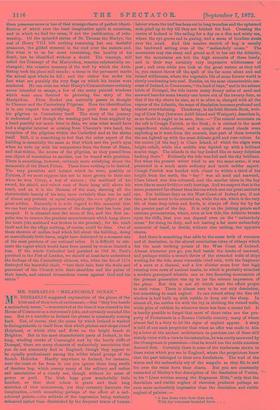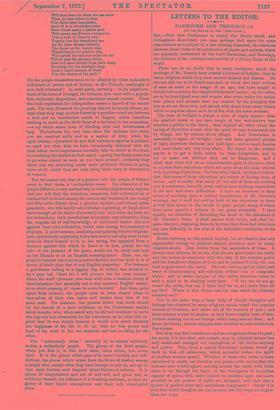MR. DISRAELI'S "MELANCHOLY OCEAN."
AV. DISRAELI'S suggested explanation of the gloom of the 1_ Irish and of their love of excitement, —that "they live beside a melancholy ocean,"—was received at the time it was uttered in the House of Commons as a statesman's joke, and certainly sounded like one. But to a traveller in Ireland the phrase is constantly coming back. Not, of course, that the ocean by which Ireland is washed is distinguishable in itself from that which pitches and chops round Holyhead, or which ebbs and flows on the bright beach at Brighton. But in the most characteristic parts of Ireland, in the long, winding creeks of Connaught and by the lonely cliffs of Donegal, there are many elements of melancholy association that you do not commonly find in England, though they appear to be equally predominant among the wilder island groups of the Scotch Hebrides. Hardly anywhere in Ireland, for instance, near the coast or far from it, can you ignore those long swells of desolate bog, which convey many of the solitary and rather sad associations of a cloudy sea, though without its sense of power or peril. The Irish bogs grow wonderfully little heather, so that their colour is grave and their long stretches of view monotonous, yet they certainly fascinate the imagination, —with something perhaps of the effect of a sad- coloured prairie,—the solitude of the impression being certainly enhanced rather than diminished by the frequent traces of human
labour where the turf has been cut in long trenches and the upturned sods piled up to dry till they are fetched for fuel. Crossing the centre of Ireland is like sailing for a day on a dim and misty sea, where the eye grows sad in gazing, and a sense of fatalism steals over the mind. And this sombre stretch of bog is usually the landward setting even of the "melancholy ocean." The mountains may rise steep and grand as if to bar out the Atlantic, but the mountains are but the high summits of these lonely,
and in their way certainly very impressive wildernesses of peat ; and even while you look at the great waters as they roll in, you cannot throw off the spell of the far more silent and sad inland wilderness, where the vegetable life of some former world is slowly condensing into coal. Besides, on the most characteristic sea- coast of Ireland, in Connemara, "the land of bays," and in the solemn inlets of Donegal, the tide leaves many dreary miles of sand and seaweed bare for some twenty-one hours out of the twenty-four, so that if the sky above be also, as it so often is, charged with all the vapour of the Atlantic, the sense of desolation becomes profound and almost overwhelming. Thackeray, in his Irish Sketch-Book, writ- ing of Clew Bay (between Achil Island and Westport), describes it, as no doubt it ought to be seen, thus :—" The conical mountain on the left is Croagh Patrick, or the Reek ; it is clothed in the most magnificent violet-colour, and a couple of round clouds were exploding as it were from the summit, that part of them towards the sea lighted up with the most delicate gold and rose-colour. In the centre [of the bay] is Clare Island, of which the edges were bright cobalt, while the middle was lighted up with a brilliant scarlet tinge. The islands in the bay looked like so many dolphins basking there." Evidently the tide was full and the sky brilliant. But when the present writer tried to see the same scene, it was presented in a much more ordinary and much sadder aspect. Croagh Patrick was hooded with cloud to within a third of his height from the earth, the " bay " was all sand and seaweed, Clare Island was dun-coloured, and the smaller islets in the bay were like so many livid (not red) herrings. And we suspect that is the scene presented far oftener than the one which met our great satirist's eye. For brilliant days on the West Coast of Ireland are, if not rare, at least never to be counted on, while the sea, which is the very life of these deep inlets and fiords, is always off duty for by far the greater part of the day. It is only on the jutting points and extreme promontories, where, even at low tide, the Atlantic breaks upon the cliffs, that you can depend even on the "melancholy ocean" for doing its duty, and not leaving a far more melancholy memorial of itself, to divide, without also uniting, the opposite shores.
And there is something that adds to the sense both of romance and of desolation, in the almost numberless ruins of abbeys which dot the most striking points of the West Coast of Ireland. Almost wherever you go, you find beside the banks of seaweed, and perhaps within a stone's throw of the stranded hulls of ships waiting for the tide, some venerable ivied ruin, with the fragment of a nave or a chancel, and a low cloister some four feet high running over rows of ancient tombs, to which is probably attached a modern graveyard wherein one or two flaunting monuments of the present generation rise up to jar the solemn impression of the place. But this is not all which mars the effect proper to such ruins. There is almost sure to be not only desolation, but something to mark neglect. In one ruined abbey the fine old window is half built up with rubble to keep out the sheep. In almost all, the nettles vie with the ivy in clothing the ruined walls, while piles of rubbish lie wherever there has been a recent fall. It is hardly possible to forget that most of these ruins are the pro- perty of Protestants in a Roman Catholic country, many of whom almost feel it a duty to let the signs of neglect appear. A story is told of one such proprietor that when an offer was made to him by a lover of the ancient architecture to purchase one of these still stately ruins with a view to its restoration, he was curtly answered by the Orangeman in possession—that he would see the noble amateur damned first. Certainly there is none of the tenderness shown to these ruins which you see in England, where the proprietors know that the past belonged to their own forefathers. The wail of the waves and the melancholy cry of the seagulls as they flit to and fro over the ruins have their charm. But you are constantly reminded of Shelley's fine description of the desolation of Venice, in his "Lines written among the Euganean Hills," only that the desolation and visible neglect of churches produces perhaps an even more melancholy impression than the desolation and visible neglect of palaces
A leas drear ruin then than now, With thy conquest-branded brow. Wilt thou then be when the sea-mew Flies, as once before it flew, `O'er thine isles depopulate, And all is in its ancient state Save where many a palace gate With green sea-flowers overgrown, Like a rock of Ocean's own, Topples o'er the abandoned sea As the tides change sullenly.
The fisher on his watery way Wandering at the close of day, Will spread his sail and seize his oar Till he pass the gloomy shore, Lest thy dead should from their sleep.
Bursting o'er the starlight deep, Lead a rapid masque of death
O'er the waters of his path."
Do the people themselves seem to be affected by these melancholy influences of nature and of history, as Mr. Disraeli, mockingly or not, half intimated ? In some parts, certainly ; in the neighbour- hood of the town of Donegal, for instance, you meet with a popula- tion uniformly despondent, and sometimes almost morose. There the Irish reputation for colloquialism seems a legend of the remote past. The very drivers of the jaunting-cars sit in moody silence, ex- cept when they urge on their horses by a peculiar vowel-cry between a wail and an inarticulate sound of disgust, which resembles nothing so much as the shrill bleat of a lost lamb in the mountains, —a cry which seems born of blinding mist and wildernesses of 'bog. Thereabouts the very inns seem like asylums into which you are received sadly and as a matter of duty, while the aged waiters,—(nowhere do you find waiters so aged as in Ireland, eo aged are they that we have occasionally observed that the time which nerve-impressions normally take to travel to the brain is something like trebled in their case),—gently but firmly press you to go away almost as soon as you have arrived ; evidently they think you are labouring under some profound illusion in going there at all, which they are only doing their duty in attempting to remove.
But we cannot say that as a general rule the people of Ireland -seem to find theirs a melancholy ocean.' The character of the people differs in a very marked way in closely neighbouring regions, and you will find the vivacious, humorous, half-cultivated air of amused self-criticism among the carmen and boatmen of one county not fifty miles distant from a gloomy, taciturn, and almost sullen peasantry, who will hardly acknowledge a greeting, or laugh aloud once through all the bustle of a country fair. And when the Irish are not melancholy, their cheerfulness is certainly very attractive, from the singular air of self-knowledge, of cultivated banter directed .against their own infirmities, which, even among the peasantry it 'displays. A poor boatman, analysing and quizzing his own litigious- ness, and actually explaining to his fare how he not only went to law when he knew himself to be in the wrong, but appealed from a decision against him which he knew to be just, purely for the sake of the pleasure of the game, would not be easily met with
on the Thames or at an English watering-place. Then, too, the people's humour has a much quainter flavour, and has more in it of nicety of shade than that of any English peasantry. For instance, a gentleman calling to a lagging dog to follow, was shouted to 'by a poor lad, 'Sure it's I will promote her for your honour,' where the word 'promote' was used with even a classical nicety of ,discrimination (but assuredly not in any common English sense), in its strict meaning of cause to move forward.' And then, quite apart from humour, the people seem to form clearer ideas to themselves of their own tastes and wishes than ours of the
same rank. For instance, the present writer was much struck by the remark of a poor workman on the Connemara marble knick-knacks, who, when asked why he did not continue to carve the bog-oak into ornaments for his customers as he once did, re- plied that Br was simply because it would very much diminish the happiness of his life to do so, that he was proud and 'fond of his work in the one material, and had no liking for the other.
The "melancholy ocean" certainly by no means uniformly -makes a melancholy people. The gloom of the Irish people, when you find it, is like their skies, often sullen, but never lard. It is the gloom which goes with moral timidity and self- distrust, the gloom which arises from the blows of destiny among a people who, except when they have lineage to rely on, are apt to lean upon fortune, and despond where fortune is adverse. It is gloom of temperament and not of self-will, and gives way as suddenly beneath the influence of a breaking sunbeam, as does the gloom of their liquid atmospheres and their soft, cloud-piled skies.



































 Previous page
Previous page